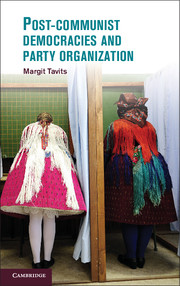2 - Organizing for Success
Party Organizational Strength and Electoral Performance
Published online by Cambridge University Press: 05 June 2013
Summary
Succeeding and surviving in the electoral arena is the first crucial obstacle that parties need to clear in order to become institutionalized and participate in the political process. Not surprisingly, then, why some political parties succeed in elections and others do not is one of the most pressing questions in electoral politics in any democracy, regardless of its age or level of development. Office-seeking parties care about the answer because they want to enter and return to office. Policy-seeking parties care about it because they, too, want to gain and keep a position in which they can exercise their policy influence. The extant media coverage of elections and the endless popular discussions and speculations about who is likely to do well and why indicates that voters, too, want to be able to predict who succeeds in the electoral game. This interest is not surprising given how important the winners are in democratic regimes. In advanced democracies, changes in party performance from one election to the next are usually relatively small. However, even these changes generate excitement among the political actors, the public, and the scholarly community because they influence government composition and policy outcomes. As argued in Chapter 1, this concern over the predictability of party performance becomes magnified in the context of new democracies, where the stakes are usually much more substantial. It is, therefore, natural to begin the analysis of whether party organizations matter by looking at their effects on party electoral performance.
Specifically, this chapter considers whether and to what extent parties themselves can guide their electoral fate by developing and strengthening their organizations. The focus will be on uncovering general patterns of organizational effects on electoral performance using statistical analysis. Recognizing that other factors also matter, the central hypothesis to be tested is that political parties that invest in building professional, specialized, and permanent central office staff; cultivating a large membership; and developing an extensive network of visible local branch offices are better able to increase their support base over time and thereby remain significant players in the electoral arena.
- Type
- Chapter
- Information
- Post-Communist Democracies and Party Organization , pp. 23 - 68Publisher: Cambridge University PressPrint publication year: 2013



